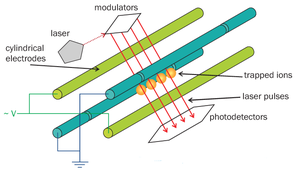Trapped ion quantum computer (nonfiction)
A trapped ion quantum computer is a proposed approach to a large-scale quantum computer.
Ions, or charged atomic particles, can be confined and suspended in free space using electromagnetic fields.
Qubits are stored in stable electronic states of each ion, and quantum information can be transferred through the collective quantized motion of the ions in a shared trap (interacting through the Coulomb force).
Lasers are applied to induce coupling between the qubit states (for single qubit operations) or coupling between the internal qubit states and the external motional states (for entanglement between qubits).
The fundamental operations of a quantum computer have been demonstrated experimentally with the currently highest accuracy in trapped ion systems.
Promising schemes in development to scale the system to arbitrarily large numbers of qubits include transporting ions to spatially distinct locations in an array of ion traps, building large entangled states via photonically connected networks of remotely entangled ion chains, and combinations of these two ideas. This makes the trapped ion quantum computer system one of the most promising architectures for a scalable, universal quantum computer.
As of May 2011, the largest number of particles to be controllably entangled is 14 trapped ions.
In the News
Fiction cross-reference
Nonfiction cross-reference
External links:
- Trapped ion quantum computer @ Wikipedia
